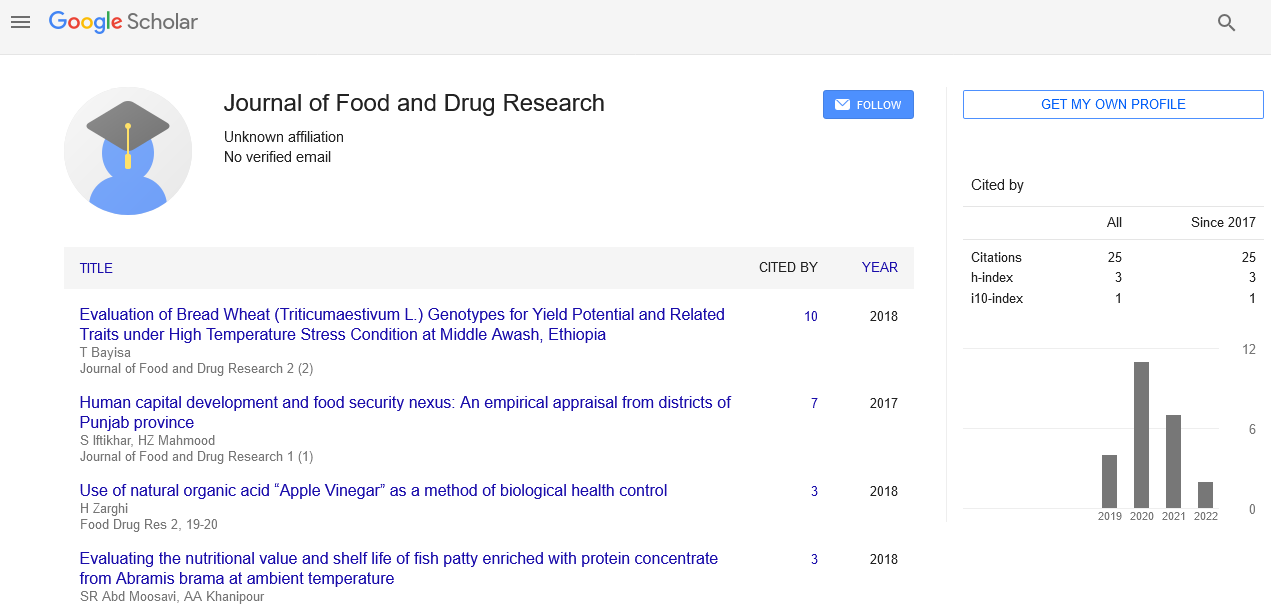Use of natural organic acid “Apple Vinegar” as a method of biological health control
Received: 21-Jan-2018 Accepted Date: Feb 07, 2018; Published: 14-Mar-2018
Citation: Zarghi H. Use of natural organic acid “Apple Vinegar†as a method of biological health control J Food Drug Res 2018;1(1):19-20.
This open-access article is distributed under the terms of the Creative Commons Attribution Non-Commercial License (CC BY-NC) (http://creativecommons.org/licenses/by-nc/4.0/), which permits reuse, distribution and reproduction of the article, provided that the original work is properly cited and the reuse is restricted to noncommercial purposes. For commercial reuse, contact reprints@pulsus.com
Various stressors factor such as changing diet, transport, diseases influence the balance of natural microbial flora in the gastrointestinal tract. Under these conditions, the use of antibiotics is inevitable in order to control or eliminate harmful microorganisms. Continuous and long-term use of antibiotics to prevent or control disease in livestock and poultry feed may lead to the presence of these compounds in the products [1,2]. Since 1997, the World Health Organization (WHO) and the Food and Agriculture Organization (FAO) have paid much attention to the potential risks of the addition of antibiotics stimulating growth to livestock and poultry diets and finally the use of growth-promoting antibiotics in Europe was banned in 2006 [3].
The short chain fatty acids (SCFA) are considered as the potential alternative to antibiotic growth promoter [4]. Acetic acid is one such SCFA, which has higher bactericidal activity when the acid is undissociated. The bacterial cell takes up un-dissociated fatty acid, which, by ionizing fatty acid inside the bacterial cell, there is a change in the intracellular pH leading to the death of bacterial [5]. Organic acids added to feed for their various beneficial effects on gut function and micro flora, feed preservation from microbial invasion, inhibition of pathogenic bacteria, enhancing mineral absorption, and improvement of nutrient digestibility [6].
Acetic acid also appears to play a role in the development of the intestinal epithelium. It is reported that acetate derived from the fermentation of non-starch polysaccharides is considered to be important for normal development of epithelial cells [7]. Adding organic acids to food or drinking water reduces the pH of the digestive system, the accumulation of pathogens in the intestinal wall, stimulates the development of beneficial intestinal microbial flora [8], helping to overcome the beneficial bacterial population to pathogenic bacteria and the reduction of toxic metabolites that produced by harmful bacteria [9].
Apple vinegar is one of the apple products that contain various types of flavonoids including quercetin, camproforol, catechins, apicotin, anthocyanin, cyanidin-3-glucoside and organic acids such as acetic acid and malic acid. Apple vinegar has antibiotic, antibacterial and antifungal properties. Beta-carotene available in apple vinegar has antioxidant properties. Consumption apple vinegar improves the immune systems as well as help to maintain the blood acid-base balance [10].
The newly studies by author and his contributors [11,12] revealed that broiler chickens drinking water supplemented with vinegar improves feed efficiency during 1-10 days of age. No effects of drinker water supplemented with vinegar on relative weights of lymphoid organs, and meat yields found. Drinking water supplemented with vinegar significantly increased villus height (VH), crypt depth (CD) and decreased small intestine muscular thickness (MT) measured at 42 days of age. Another important finding of the present studied was the reduction in carcass abdominal fat content by drinking water supplementation of vinegar. Finally organic acid might be promising alternatives for to eliminate antibiotic in broiler chicken production.
Acknowledgement
We greatly appreciate the financial support of this research from vice president in research at the Ferdowsi University of Mashhad, Iran.
REFERENCES
- Baurhoo B, Ferket PR, Zhao X. Effects of diets containing different concentrations of manna oligosaccharide or antibiotics on growth performance, intestinal development, cecal and litter microbial populations, and carcass parameters of broilers. Poultry Science. 2009; 88:2262-72.
- Samli HE, Senkoylu, Koc F, et al. Effects of Enterococcus faecium and dried whey on broiler performance, gut histomorphology and micro biota. Archives of Animal Nutrition. 2007;61:42-9.
- Chaves AV, Stanford K, Dugan MER, et al. Effects of cinnamaldehyde, garlic and juniper berry essential oils on rumen fermentation, blood metabolites, growth performance, and carcass characteristics of growing lambs. Journal of Livestock Science. 2008;117:215-24.
- Van Immerseel F, Fievez V, De buck J, et al. Microencapsulated short chain fatty acids in feed modify colonization and invasion early after infection with Salmonella enteritidis in young chickens. Poultry Science. 2004;83:69-74.
- Khan SH, Iqbal J. Recent advances in the role of organic acids in poultry nutrition. Journal of Applied Animal Research. 2016;44:359-69.
- Dehghani TN, Jahanian R. Effect of supplemental organic acids on performance, carcass characteristics, and serum biochemical metabolites in broilers fed diets containing different crude protein levels. Animal Feed Science and Technology. 2016; 211:109-16.
- Bron F, Kettlitz B, Arrigoni E. Resistant starches and the butyrate revolution. Trends Food Sci. Technol. 2002;13:251-61.
- Alp M, Kocabagli N, Kahraman R et al. Effect of dietary supplementation with organic acids and zinc bacitracin on ileal micro flora, pH and performance in broilers. Turkish journal of Veterinary and Animal Science. 1999;23:451-5.
- Thompson JL, Hinton M. Antibacterial activity of formic and propionic acids in the diet of hens and salmonellas in the crop. British Poultry Science. 1997;38:159-65.
- Shahidi F, Mc Donald J, Chandrasekara A, et al. Phytochemicals of foods, beverages and fruit vinegars: chemistry and health effects. Asia Pacific Journal of Clinical Nutrition. 2008;17: 380-2.
- Allahdo P, Ghodraty J, Zarghi H, et al. Effect of Probiotic and Vinegar on Growth Performance, Meat Yields, Immune Responses, and Small Intestine Morphology of Broiler Chickens. Italian Journal of Animal Science.
- Allahdo P. Effect of Apple Vinegar Addition to the Drinking Water on Growth Performance, Ileal Lactobacillus Population, Digestive Chyme pH and Immune Response of Broiler Chickens. Research on Animal Production. 2017;8:55-62.






